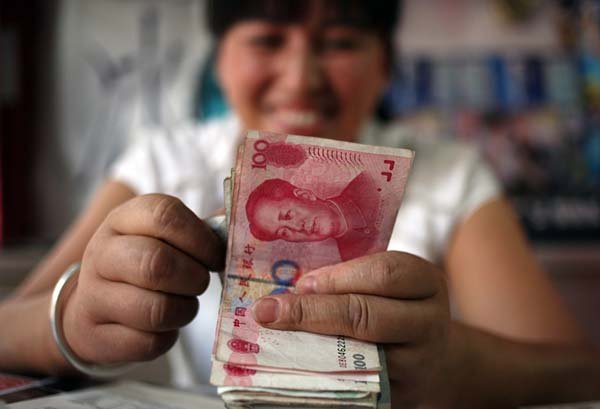SHANGHAI, China — The Chinese yuan surged to a record high Monday as Beijing delivered on its central bank’s weekend promise of greater flexibility in its exchange rates.
World stock markets mostly rallied as investors took heart from the signal of confidence in China’s resilience.
By loosening its currency’s peg to the dollar, China is seeking to defuse complaints that it keeps its exports artificially cheap and ensure its economy can keep growing at a healthy pace.
A stronger yuan will also help curb inflation in the world’s third-largest economy and shift investment toward service industries from export-manufacturing, the People’s Bank of China said Sunday. The change could provide help to U.S. manufacturers by making their products more competitive.
Analysts said the move was not a major shift in foreign policy. They described it instead as a maneuver aimed mainly at countering criticism of Beijing’s currency policies before this weekend’s summit of the Group of 20 leading economies.
“This is a type of ‘diplomatese’ before the G-20,” said Yi Xianrong, an economist at the Institute of Finance in the Chinese Academy of Social Sciences, a government think tank.
White House officials said they are encouraged by China’s promise to allow flexibility in its exchange rate but cautioned the real test will be how well the pledge is enacted.
White House spokesman Bill Burton said “we’re obviously encouraged” and said the administration is monitoring the implementation.
Burton said currency will still be a topic at the G-20 summit in Canada.
He said leaders are striving for a durable economic recovery and “currency will certainly be a part of that discussion.”
China’s decision to let its currency rise in value adds buying power to its growing middle class - a win for American electronics makers, which can sell more computers and iPods to a hungry market.
At the same time, it puts a squeeze on U.S. retailers such as Wal-Mart because Chinese imports suddenly cost more. And prices may not fall as fast for high-tech products made in China.
Beijing’s decision to give up the dollar link it imposed two years ago to help its exporters during the recession also shows it recognizes the need for flexibility in its own economic policies.
“Chinese policymakers are attempting to engineer a scenario that maximizes political goodwill while at the same time minimizes any negative economic impact,” said Alaistair Chan, an economist at Moody’s Analytics in Sydney.
The shift away from the dollar peg pushed the yuan to 6.7971 on Monday from 6.8272 yuan on Friday. It was a shift of 0.4 percent and an abrupt break from the narrow range around 6.83 yuan to $1 that had held since mid-2008.
The decision to revert to a basket of currencies including the U.S. dollar, rather than the dollar alone, to set the exchange rate restores policies in place before the global recession walloped Chinese manufacturers in 2008. Millions lost their jobs.
China had set up the basket-linked exchange rate system in July 2005, allowing the yuan to gradually gain nearly 20 percent until the financial crisis hit.
China’s economy surged 11.9 percent in the first quarter of this year, and exports jumped by nearly 50 percent over a year earlier in May. That was despite expectations that Europe’s debt crisis would hit demand in the 27-nation European Union, China’s biggest trading partner.
Such trends raised expectations that China would adjust policies that critics say keep the yuan undervalued, unfairly holding down prices of Chinese products overseas and making them impossible to compete with.
U.S. Treasury Secretary Timothy Geithner’s immediate praise for the central bank’s announcement suggested the move was coordinated to allow him to release a report on China’s currency, postponed for more than two months, without having to accuse Beijing of manipulating its currency, Qian Wang, an economist at J.P. Morgan, said in a note to clients.
Geithner delayed the release of the report to allow more time for talks with the Chinese, and the shift in policy is viewed by many as a concession by Beijing.
But President Barack Obama’s administration still faces pressure from Congress to name China a currency manipulator, a designation that could potentially lead to U.S. trade sanctions.
Information for this article was contributed by Elaine Kurtenbach, Bonnie Cao, Ji Chen, Martin Crutsinger and Christopher S. Rugaber of The Associated Press and Judy Chen, Belinda Cao, Bob Chen, Frances Yoon, Yanping Li, Patricia Lui of Bloomberg News.
Front Section, Pages 1 on 06/22/2010
